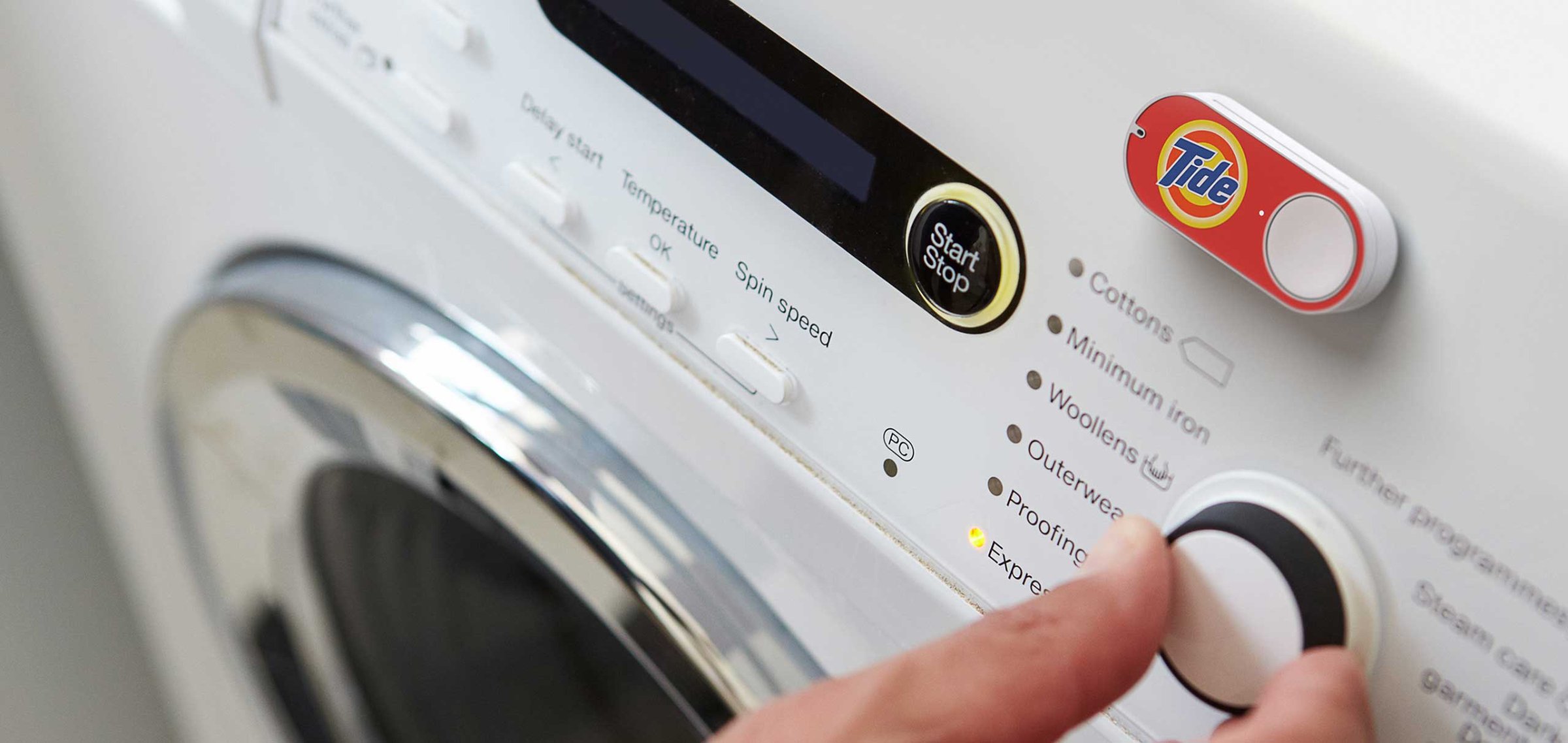
For all the jeering that has accompanied Amazon’s new Dash Button this week, the little gadget feels an awful lot like a sign from the future. Right now, it may seem unlikely any sane consumer would decorate their bathrooms and pantries with thumb-sized, Wi-Fi enabled gadgets that let them instantly re-order coffee pods, instant breakfasts, disposable diapers, and other household necessities. But Amazon has already demonstrated how readily we adopt seemingly bizarre behaviors when we’re offered a potent new increment of convenience. With Dash (“Place it. Press it. Get it”) Amazon CEO Jeff Bezos is merely taking the model of instant, reflexive consumption he has already successfully promoted with Prime and One-Click (and soon, drones) and embedding it into the very architecture of our lives.
Dash is just an appetizer. By most accounts, these gadgets are the opening move in a much larger enterprise: merging the consumer marketplace with the so-called “Internet of things.” By building Web-linked sensors into everything from your refrigerator and medicine cabinet to your pet’s collar and your infant’s diapers, Amazon and others want to transform our entire built environment into a vast, sophisticated consumption device — starting with the “smart” home. As Richard Doherty, with the Envisioneering Group consultancy, puts it, “Google is trying to map everyone’s living room with cameras and phones and Amazon wants to map your kitchen and bathroom storage.”
And maybe that should worry us. Don’t get me wrong: The push for ever-greater convenience is one of the most powerful social forces around and a huge catalyst for progress. Hospitals, for example, are already experimenting with automated systems for dispensing medications — and are seeing serious improvements in accuracy and cost-savings. Farmers monitoring crops in real-time will be able to precisely deliver water, fertilizers, and pesticides, thus reducing waste. Cities will be able to improve traffic congestion and energy use.
But when it comes to consumer convenience, we need to consider whether easier really is always better. Online shopping, for example, is already so effortless that we often don’t remember we’ve ordered something until the package arrives at our door. What happens when consumption becomes even less of a conscious process — when, say, our smart cupboards and refrigerators, empowered to monitor what we’re using, start making buying decisions autonomously?
There are also privacy concerns. With the oceans of data these systems collect, marketers will be able to dig ever more deeply into our decision-making processes. The result: Our homes, cars, and the rest of the built environment will “know” more about why we buy (or vote, or interact with our families) than we do ourselves. One needn’t be a Luddite or a radical libertarian to worry about turning over so much of our inner lives to an external system whose ultimate objective must be to increase consumption.
As important, might it be possible to make things too easy? Systems like Amazon’s Dash are attractive because they let us skip routine tasks, such as managing the household, which gives us more time for things that are more important to us. But when we eliminate even a mundane task, we also lose some of the mental skills that the task required. Granted, losing the mental skills needed to compile a shopping list hardly seems a cause for worry. But we should consider that loss as part of the broader “de-skilling” of everyday life with the spread of automated conveniences.
Think of the way the convenience of texting and other digital communication is changing the way we process information and learn. Just this week, researchers at Princeton and UCLA published a study showing that students who take lecture notes with their laptop computers rather than write notes by hand are less likely to grasp the deeper concepts in the lecture. Or look at how the ease of a credit-card purchase can diminish our capacity to process financial information. According to research by Dilip Soman at the University of Toronto, people making credit purchases are much less likely to remember the amount of the purchase than are those who pay in cash. In the same way, onboard GPS and turn-by-turn driving directions, by removing the need to pay attention while we drive, can make us less observant of the terrain we’re driving through – and leave us disoriented if our GPS fails. Probably, the gradual deskilling of housework isn’t going to leave us intellectually paralyzed. But it does represent another step in a broader diminishment of everyday competencies that, in many cases, we are already missing.
Not that such concerns are likely to slow the trend that the Dash Button represents. To the contrary, the Internet of Things is here to stay, and so are its blessings and burdens. Over the next decade, more and more of our built environment will become intelligent and capable of doing things for us: anticipating our needs and desires, and making our lives easier—regardless of whether such convenience is actually beneficial. The only plausible response to such a smart environment is a smart consumer—that is, one who understands the double-edged nature of this next generation of convenience—and who instinctively understands that easier isn’t always better.
More Must-Reads from TIME
- Why Trump’s Message Worked on Latino Men
- What Trump’s Win Could Mean for Housing
- The 100 Must-Read Books of 2024
- Sleep Doctors Share the 1 Tip That’s Changed Their Lives
- Column: Let’s Bring Back Romance
- What It’s Like to Have Long COVID As a Kid
- FX’s Say Nothing Is the Must-Watch Political Thriller of 2024
- Merle Bombardieri Is Helping People Make the Baby Decision
Contact us at letters@time.com